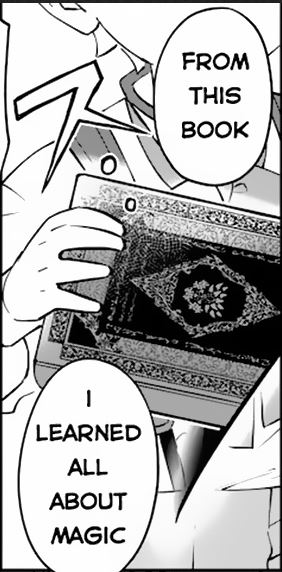
You can feel it sometimes, can’t you? You’re reading a manga or a light novel and while the English seems fine and you can understand what’s being said, but it still feels off somehow? Especially if you’re being a bit naughty and reading a scanlation. It’s readable, but it doesn’t flow nicely. Like in that example to the left I came across today. That’s not the way we’d structure that sentence in English, is it? You’d normally say “I learned all about magic from this book”, not the other way around. But if you understand Japanese enough to follow the flow when watching subbed anime, you may have noticed that its sentence structure is different from English, often switched around from what you’d expect in English. In Japanese, that sentence makes sense; in English it’s still perfectly understandable but doesn’t flow.
Which is one of the most obvious, simplest reasons why you just cannot translate text like this and not rewrite it. Not to shame the person who did this translation, but this is very much a first draft attempt. What they should’ve done next is walk critically through the entire text and rewrite and remove any such awkwardness. Because while this manga might be readable, all these little errors and awkwardnesses make it harder to enjoy it. Not that I mind too much when it comes to amateur translators doing this as a hobby. It’s not as bad as e.g a supposedly professional translator not realising something is an idiom and translating it literally, just awkward. Not that I haven’t seen that same mistake done in scanlation, one time the translator had used the literal Korean saying, which made no sense in English, then had added the English equivalent in a translator note. At which point you’re being deliberately obtuse, but it touches upon one of the greater sins of scanlation. A misguided desire to keep the translation as close to the original as possible, even if it comes at the expense of readability, to make it seem as Japanese (or Korean…) as possible in English.
I understand that desire, really I do! You want to give people as close to the same experience as you, who can read Japanese. But it makes your translations suck. English awkwardly constructed to function as much as possible as Japanese suck. Endless repetitions of the unnatural “this child” when referring to somebody rather than using a proper pronoun or even their fucking name sucks. Not translating names or phrases when there are perfectly good English equivalents sucks. Yes, you shouldn’t translate onigiri as jelly donuts but rice balls gets the meaning across just as well. You can translate 水に流す (mizu ni nagasu) as “water flows”, but “It’s all water under the bridge” is better understood. (From.) Translating means rewriting, to make your prose flow better, read more easily and be more understandable to your audience. If you don’t, you’re only doing half your job.
No Comments